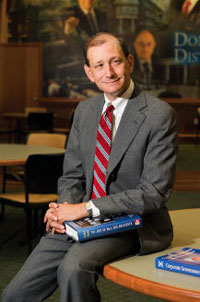A government role in corporate governance?

ON THE GREEN | The financial crisis that led to the economic recession of 2008 was caused by a combination of factors and exacerbated by poor corporate oversight structures and congressional action in 1993, according to Charles Elson, Edgar S. Woolard Jr. Chair and director of UD’s John L. Weinberg Center for Corporate Governance.
Elson, who has been widely quoted on the topic by leading U.S. and international news organizations during the past year, warns against government interference in corporate governance and says that the only way to protect shareholders’ interests is through transparency and real competition in corporate board elections.
“The problem is that the federal approach would ultimately create a bureaucratized compensation process, which would ultimately diminish the authority of the board, which would ultimately reduce effective monitoring,” he says. “I don’t think anyone’s really thought this thing out.”
Elson says the Sarbanes-Oxley Act of 2002, which was enacted as the government’s response to massive accounting scandals at Enron and Worldcom with power to oversee financial practice and corporate governance, is a good example of the bureaucratization of corporate oversight responsibility, which fell short amid the weakening of the financial positions of major companies in 2008.
“It was imposed from the top down, and any time you do that people act because someone is telling them to do it, to be a legal requirement, and it’s never going to be all that effective,” he says.
Corporate governance may have been a factor in the market meltdown of 2008, Elson says: “Had you had better boards, would this have been as severe? I don’t know, no one really knows, but in most of those large financial institutions, no one believes that those boards were particularly strong counterweights to corporate management, and that was a problem.”
Additionally, he says the widespread use of stock options, which was the result of congressional efforts to rein in executive compensation, “resulted, unfortunately, in the compensation nightmare we’re dealing with now. Congress, in the early 1990s, adopted amendments which enabled the options explosion that created this mess.”
Elson, who at that time wrote that the measures could have unintended consequences, says Congress in effect limited pay unless it was incentive-based, and corporations began using options in heavy doses as a way to meet the new requirements.
“The overuse of options created a tremendous increase in executive pay and led to the incentive for the manipulation of financial statements that we’ve seen in the last couple of years,” he says.
“The option is supposed to link your interest to the shareholders, but if you exercise the option and sell, you’re no longer linked. And if you can, let’s say, prop up a company’s numbers, exercise and get out before bad news comes out, it runs completely contrary to shareholders.”
Elson predicts that the financial crisis will eventually work itself out but says the world is still struggling for long-term solutions. He insists that the answer lies in more focus on boards, their composition and the election process.
A recent change in Delaware corporate law that requires more open elections for directors is a good example of effective measures to stimulate reforms in corporate governance and put more focus on investors, he says, adding, “Some of those changes came out of some of the discussions that we’ve had here at the Weinberg Center over the years.”
The Weinberg Center plays an important part in the Lerner College’s undergraduate experience through a course on advanced corporate governance, which is taught by Elson and features panel discussions by some of the nation’s leading executives, lawyers, academics, journalists and judges.
This fall, the course, Seminar in Corporate Governance, drew a record 50 students. Scheduled topics included “TARP and Government Ownership of Publicly Traded Companies” and “Federal vs. State Corporate Governance Standards.”
Article by Martin A. Mbugua, BE ’09M





